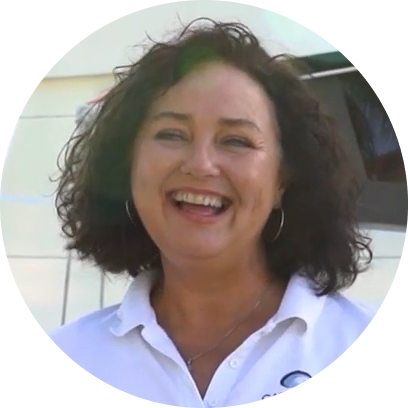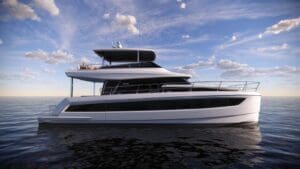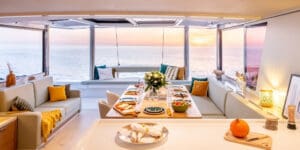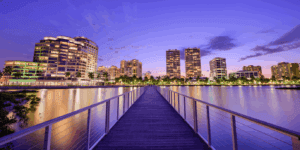Overseas Radio Network – Cruising Tips & Myths, Interview with Catamaran Cruisers
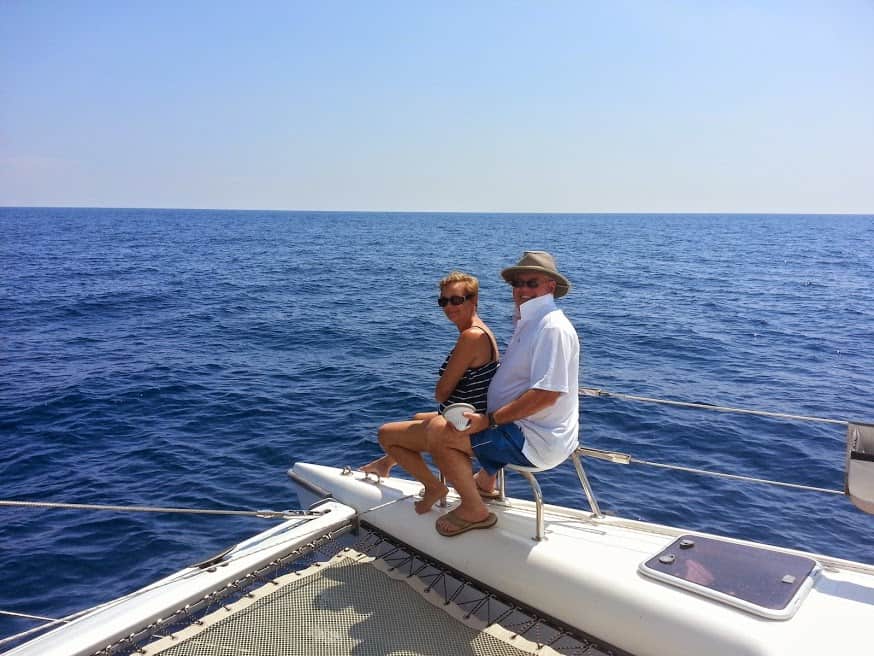 In the Overseas Radio Network Show 3, Segment 2, Stephen and Estelle share some Cruising tips and myths , then we talk with liveaboard cruisers, Don and Lynda about:
In the Overseas Radio Network Show 3, Segment 2, Stephen and Estelle share some Cruising tips and myths , then we talk with liveaboard cruisers, Don and Lynda about:
- Favorite type of yacht to cruise
- Entering a foreign country Is easy on a yacht
- Why did you cecide to go sailing?
- Putting their boat into charter
- Favorite places to cruise on their yacht
- Cruising budget
- Provisioning for cruising
- What they would do differently when cruising
GARY: Welcome back to our show we are here with our guests, Stephen Cockcroft and Estelle Cockcroft. And we were talking about what keeps you up at night when you are sailing off shore, Estelle tell us about that.
For a transcript of this podcast, click “read more” below.
ESTELLE: Nothing really keeps me awake. When I sleep, I sleep. The only thing that will wake me up is Stephen.
GARY: How does that happen?
Keeping Watch While Cruising
STEPHEN: Sometimes you have to make her do watch.
GARY: And speaking of that, what type of watch schedule do you normally use when off shore?
STEPHEN: Well, if we are making a long passage what I do…and this might sound a little bizarre but…I have an egg timer with a lanyard that you can hang around your neck. When we sailed from Cape Town to the US, it was a 7, 000 mile voyage on sea for 41 days. So we had to have a fixed schedule. During the day I don’t really bother with the schedule because there is always someone on deck but at night from 6 pm to 6 am or 6 pm to 8 pm, I generally don’t like to put people longer than 2 hours at a time. And what I do is I give them an egg timer and they have to, every 12 minutes, go and walk around. Well not walk around, but to go and spend 3 minutes looking around for lights and then I don’t care they can play on their computer. They can even sleep.
As long as they wake up every 12 minutes and do a look around and then if there is anything, obviously let me know. I got to the stage if the egg time didn’t go off I would wake up because I thought that my person on watch was sleeping.
ESTELLE: Watches are just not that much fun and I started seeing all kinds of anchor lights even in the middle of the ocean.
GARY: Wait, what was she having to drink?
STEPHEN: I think she was being erroneous.
ESTELLE: Yeah, I see these boats anchored out in the middle of the ocean and I would wake Stephen up and say come, come there is a boat right in front of us.
STEPHEN: She called the evening star a VHF once.
ESTELLE: Yes, so these things happen.
GARY: Okay, you have to be on watch for 2 hours and how much do you get off and can you sleep?
STEPHEN: Well generally what we have is we have probably 3 to 4 crews so let’s just say you have 3 in the group. You are 2 hours on and 3 hours off you have fine that you can become conditioned so when you get off you go straight to sleep and you generally even wake up after 4 hours.
GARY: Okay so I understand that some yachts have radar and an alarm that goes off when somebody comes into range, right? And you can set that range. Did we talk about that? Did you ever have that?
STEPHEN: Yes, that’s correct. It’s called the guard. You can set it at the distance that you want. Generally, you can set it at 1 mile 2 miles, 3 miles, 4 miles. And anything that goes through that protective band you can have it just forward looking or you can have it all around. And when something breaks that guard when a return signal comes in that guard, then an alarm goes off. But not a good idea to rely on the radar people are much more reliable.
GARY: Yeah, but isn’t it really good to have when you are out at night and fog or rain or something like that?
STEPHEN: When you are in the open ocean, really, I would only switch it on if I see something because you obviously are trying to conserve power but radars probably the single most important equipment in my opinion because when you can’t see you really need to have one.
Common Cruising Myths
GARY: Okay, tell me what you think is a common cruising myth.
ESTELLE: Gary, I would say that you would have to completely stock your boat with food from your own country remember everybody in the world eats, when I first left from South Africa I packed my boat so full of eggs, right? Fresh eggs. That by the time we got to the next destination half of it was rotten. But I was absolutely determined that I had to have 2 eggs per day for every crew member can you imagine how many eggs I would have to store. It was crazy. But I learned very quickly that everybody eats around the work but you make do.
STEPHEN: You don’t have to carry tons of food. We dropped border line a couple of inches. We thought that the only place that had food was South Africa. And then we quickly discovered that you can buy food everywhere so your basic provision rice, flour, sugar, etc. and emergency rations of spam and beans in tins that sort of things is always good to carry but just always rely when you get to the next there will be food to get.
ESTELLE: And the other thing I would say I would say is that people think that you sail all the time. I would say you probably anchored 90% of the time so you are not in the elements sailing, standing watches, and biting your nails. You are in anchor 90% of the time and its really good.
STEPHEN: Sailing is the worst part of cruising because you have to get to the next destination but you know you don’t do a lot of it by comparison percentage wise it is 5% in reality.
GARY: And that’s another reason why when i am looking at a boat I think the most the biggest factor should be how comfortable is it when you are stopped at the dock or the anchor. And not necessarily, oh, let’s get this other boat because it is 1 knot faster. I don’t think it is much of a difference.
STEPHEN: It is the “being there”. The getting there is fun, but the “being there” is the big deal.
Biggest Lesson Learned While Cruising
GARY: Okay, what is your biggest lessons learned.
STEPHEN: Well, the biggest lesson learned for me was that you have to be…it’s the 7 Ps you know, proper planning and preparation prevents a bad performance. But you know preparation is everything. Then I learned, you know, if you think you should have done something then it should be done. And if something does go wrong, don’t leave it. Fix it because normally when you have a disaster, it is a collection of things that goes wrong, not just one big thing.
GARY: And, Estelle, what you learned as a big lesson just don’t buy a lot of eggs?
ESTELLE: Yeah right, I would agree with Stephen, you know. Be prepared you could never be too prepared and definitely that thing that is broken lying broken in the corner that you meant to fix or you meant to redo that’s the thing that is going to come back at you so fix everything.
GARY: Okay, sounds like good advice what’s the key to making the cruising life enjoyable.
STEPHEN: I think the key is that you got to keep moving. The exciting thing for us about cruising was that we were never backtracking. We were always going to a new place with new adventures. So, for that, definitely it is keep going, don’t backtrack.
ESTELLE: For me, it was all about connecting with the locals. Going there get to know them get to know their language, see what they eat, what why they do thing. Definitely, that is what I would say the most exciting thing for me about cruising.
STEPHEN: And she would take me to look at piles of rubbles she calls it ruins and history. But, hey, they’re these piles of ruins and rubbles she dragged me to Egypt and all over Europe.
Favorite Gear for a Catamaran
GARY: Okay, tell me what are some of your favourites pieces of gear on the boat and why.
STEPHEN: Well my 2 favourite pieces of gears are the auto pilot and my dingy. My dingy’s name is Trigger, like the horse. And that’s essentially my car that gets us from the boat to shore and that’s a very important of gear and I protect that at all cost. And then, of course, is Ray our auto pilot which is also absolutely critical because I don’t like helm I normally helming my 2 foot off the dock with autopilot.
GARY: Okay well we have to take a short break and we will be right back you are listening to yacht’s the perfect escape vehicle and this is Gary Fretz.
Welcome back this is Gary Fretz and you are listening to the perfect escape vehicle we are here today with Stephen Cockcroft and Estelle Cockcroft and we have some new guests, Don and Lynda. Stephen, how did you meet them?
STEPHEN: Don and Lynda were sailing school students on our monohull in the Caribbean 16 years ago and we have been firm friends ever since and Dona and Lynda like the lifestyle. So they bought themselves a catamaran and they have come all the way down the Mississippi all the way down to the Gulf [of Mexico]. And they were on route to escape to the Bahamas so and I get back to Don and Lynda.
Favorite Type of Yacht to Cruise
GARY: Wow, so you are living the dream. Tell me something what is your favorite type of yacht to cruise and why?
DON: Well, we got the catamaran Island Spirit. And we enjoy a catamaran because it get us plenty of room it is very stable. We used to have a monohull that Lynda didn’t enjoy the heeling over when we were sailing. And she much prefers the catamaran that you are on nice firm level ground there is a lot of room for cooking we got 3 state rooms on here we have guest with us all the time which works out it is almost like travelling in your home basically we have everything.
Entering a Foreign Country Is Easy on a Yacht
GARY: In your experience, isn’t it true that arriving in a foreign country in a yacht is much easier to do enter and stay in most countries than when you do so, on an airliner for example?
STEPHEN: Well, we got property in Canada and now we go over into Canada and we find that very, very, easy we go in and we obscure a little immigration officer they have there that we just call in 1 800 number and talk to the customs officer and he gives us a 7-digit number to post in the window and we are on our way.
GARY: Wow, so you don’t even have anybody come on the boat. We see no one. We have no boat inspection.
STEPHEN: We have nothing. It is just you call in the office talk to somebody on the phone and you are gone on your way.
GARY: Sounds like they really want you to visit them is that the feeling you get.
STEPHEN: Yes, they actually love you to come over they are smart in that respect because you go to the county you send money there on the other hand coming back into the United States it seems as through hey kind of run you through the ringer it is actually surprising here in the US passport it seems like it is harder coming back in your own country.
Why Did You Decide to Go Sailing?
GARY: Wow, it seems like everybody says that. Tell me something what possessed you to first go sailing? And tell us about some of the favorite countries you visited,
LYNDA: What first possessed us? We went and chartered a boat in the BVI and had a great time on vacation. And we decided that if we enjoyed it so much and decided that we should try and do a sea school for a week to make sure this is the direction that we want to go. So we found Stephen and Estelle and they were phenomenal teachers and friends now after 16 years. And had a great experience. And then we started with our plan. And we decided that we were going to get a catamaran and to be able to afford it we decided that we want to put it into charter service.
Putting Their Boat into Charter
GARY: Why did you want to do that?
LYNDA: To help pay for it. There is a large tax advantage and, of course, the income also helps.
GARY: So let’s see you had your boat in the Great Lakes for a while and then down south in Florida?
LYNDA: Yes, we had it in Fort Lauderdale for a couple years and we had it in the Great Lakes for 3 years, so a total of 5 years in charter.
GARY: What sort of money did you end up with net in your pocket in those years?
LYNDA: It varied depending on the season there is not an exact amount and again there is a huge tax benefit so you have to facture that in also.
GARY: Right. One of the taxes benefits I know about is the second home you got so if you don’t already have a second home you can deduct that interest that you pay on your loan and you all had to get a loan to get the boat right?
LYNDA: Yes, that’s correct. In fact, we did take a loan out through a bank that Stephen set up for us but also a big advantage for not necessarily as a second home but as a business deduction because you can. The boat is in charter, it is a business, and again it is a nice tax deduction.
GARY: Yes that’s the active business deduction that you can take and if you would like more information on that go to the website catamaranguru.com and you will find details about the active business deduction and other ways to make money or to save money on taxes with your boat.
Okay, what were some of your favorite places?
Favorite Places to Cruise on Their Yacht
DON: We seem to be drawn to islands and different places that are more along the lines of nature. We enjoy SCUBA diving, snorkelling, the jungle…different things like that. Belize was wonderful and a lot of the islands in the Caribbean. We are not so much the city folks but we do enjoy the nature of things.
GARY: Lynda, what would you say to those women who have a fear of leaving their friends families and a comfortable home?
LYNDA: Well, first of all your boat is your home and you do not have to sell every single thing. You take so many…you can take you know your favorite pillows you can take your knickknacks. There is room on your boat for some things. And again, it is your home. And also you communicate. With technology today there is of course Skype talking on the internet seeing your friends’ emails, texts, internet, you do get to communicate plus you meet some wonderful new people in the boating community.
GARY: Well, you get to have a lot of friends come and stay with you in exotic places right?
LYNDA: Nobody ever complains.
GARY: Okay, tell me something, everybody answers this question differently so I would love to just know how much does it cost to cruise.
Cruising Budget
LYNDA: Well, you know, everybody has a different budget. We’ve seen since we have been cruising we seen people cruise for as little as $700-800 per month and we have seen budgets of $6000-7000 a month. There is everything in between. And it is really what your comfort zone is and what you are willing to do or things you are willing to give up and not give up which will abide by your budget.
GARY: What would drive the cost up? I mean how could you have, I have heard people say, “I can’t figure out how to spend more than $3000 a month.” So what are some of the things that can drive cost up?
LYNDA: I think the biggest cost that can drive the cost up is marinas. When you do a daily dockage, that is quite a bit more expensive than you get a week break on pricing or a month break on pricing. Also, of course, restaurants tend to add up quickly and it depends on how you provision, also.
GARY: Aha, by the way, there is a little trick that I have used and it doesn’t always work. But when you go into a marina, it helps to ask the dock master, “Can I have your annual rate?”. And even if you don’t stay there for a full year, they will often times give you that annual rate which could be half the price of the daily rate.
LYNDA: What a great idea. I haven’t tried it.
GARY: You learn something new every day. Okay, is it true that you can also catch a fish and lobsters and things like that to sort of supplement your provisions?
Provisioning for Cruising
DON: Sure. Usually if we are cruising or whatever and we are sailing, a sailboat got a great speed that it is travels at you can take a couple of hem lines and run a catamaran is great because it is nice and long and wide you can run a line off each of the scoops and the lines won’t get tangled up or anything and all of a sudden you look back and there is s fish flapping around in the water and you pull it in and we got great scoops that go right down into the water and we sit back there and we filet the fish up on the back scoop and just knock the guts off back into the water and its free food.
What They Would Do Differently When Cruising
GARY: Nice, now if you were going to do it again what would you do differently, would you get a different boat go on a different route? What do you think?
DON: Well, we are just getting started on the cruising. We tried it a couple years ago and we have use a boat intermittently when it was being chartered out. But now we are in the boat, like I said, we are just starting out. We just completed The Great Loop which is up the east through the Great Lakes down to Mississippi. And now we are going to take off to the Bahamas and the catamaran has been wonderful. It’s a nice stable home and it is perfect to travel.
GARY: Okay, well we are going to have to take a short break and we will be right back to talk about cruising and why yachts make the perfect escape vehicle. This is Gary Fretz and you are listening to the Overseas Radio Network.
